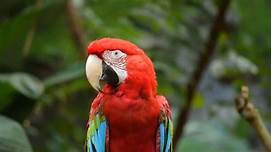How Long Do Parrots Live as Pets?
Parrots are fascinating and intelligent birds that make captivating companions. Understanding their lifespan and factors influencing their longevity can help you provide the best care for your feathered friend.

Average Lifespan of Parrots as Pets
1. Small Species (Budgies, Cockatiels, Lovebirds):
5-10 years: Smaller parrot species typically have shorter lifespans. Budgies and cockatiels can live up to 10 years, while lovebirds have a slightly shorter lifespan ranging from 5 to 8 years.
2. Medium-sized Species (Parakeets, Conures, Caiques):
15-20 years: Medium-sized parrots often live longer than smaller species. Parakeets can reach up to 15 years, while conures and caiques have lifespans ranging from 15 to 20 years.
3. Large Species (African Greys, Cockatoos, Macaws):
20-60 years: Larger parrot species tend to have the longest lifespans. African greys can live for over 50 years, while macaws and cockatoos can reach up to 60 years of age or even longer with proper care.
Factors Influencing Parrot Lifespan
1. Species and Genetics:
Different parrot species have inherent lifespans determined by their genetics. Larger parrots generally live longer than smaller ones.
2. Diet and Nutrition:
A balanced and nutritious diet is crucial for a parrot's health and longevity. Providing a variety of fresh foods, including fruits, vegetables, nuts, and seeds, ensures they receive essential nutrients.
3. Proper Veterinary Care:
Regular veterinary checkups and prompt treatment of illnesses or injuries can significantly extend a parrot's life. Vaccinations and parasite control are also important.
4. Housing and Environment:
A spacious and stimulating cage or aviary provides a safe and comfortable living space for parrots. Proper ventilation, temperature, and humidity levels are essential.
5. Socialization and Interaction:
Parrots are social creatures and require regular interaction with their owners. Spending time with your parrot, engaging in play and conversation, helps keep them mentally stimulated and happy.
Enhancing Your Parrot's Lifespan
1. Provide a Healthy Diet:
Offer a diverse diet rich in fresh fruits, vegetables, and quality pellets. Avoid sugary treats and excessive amounts of fatty foods.
2. Ensure Regular Exercise:
Encourage your parrot to fly around the room or provide toys that promote physical activity. Exercise helps maintain a healthy weight and prevents boredom.
3. Create a Safe and Stimulating Environment:
Provide a spacious cage with perches, toys, and climbing structures. Rotate toys regularly to keep your parrot engaged.
4. Provide Social Interaction:
Spend quality time with your parrot each day. Talk to it, play games, and offer treats as rewards. Social interaction helps prevent loneliness and depression.
5. Seek Veterinary Care:
Schedule regular checkups with an avian veterinarian to monitor your parrot's health. Early detection and treatment of illnesses can improve its lifespan.
By following these guidelines, you can provide your parrot with the best possible care and help it live a long and happy life as your companion.Declaration: All article resources on this website, unless otherwise specified or labeled, are collected from online resources. If the content on this website infringes on the legitimate rights and interests of the original author, you can contact this website to delete it.





